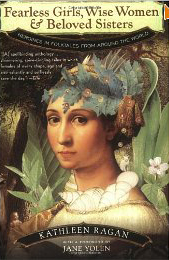Kathleen Ragan
Books: Folk Tales
Fearless Girls, Wise Women & Beloved Sisters (1998)
Fearless Girls, Wise Women & Beloved Sisters (1998)
 This is collection of stories from myth and folklore about and starring women. It's an interesting idea, and the stories she collects are good--many I had never read before, but her notes following each story are really irritating. When I first saw the notes, I was quite interested, thinking that they would be notes on the different cultures, or even historical notes about women at the time the tale was collected. But no, every note is simply a little "women are great!" blurb showing how the woman in the story was a strong character and preserved against adversity. After every single story we get the same thing, just different names.
This is collection of stories from myth and folklore about and starring women. It's an interesting idea, and the stories she collects are good--many I had never read before, but her notes following each story are really irritating. When I first saw the notes, I was quite interested, thinking that they would be notes on the different cultures, or even historical notes about women at the time the tale was collected. But no, every note is simply a little "women are great!" blurb showing how the woman in the story was a strong character and preserved against adversity. After every single story we get the same thing, just different names.
To say that I find this irritating would be a bit of an understatement. These are fantastic stories that stand on their own. They don't need feminist apologetics to explain the characters or anything else. The notes, as I said, could have been a fantastic addition to each story, telling us a little something about the different cultures from which the stories come, but instead they give the entire a book an overtone of feminist propaganda. This has really ruined much of the book for me. And it's not that I'm anti-feminist, I simply don't need the obvious virtues of story characters extolled after each and every story.
There are, however, some very good tales. My Jon's Soul from Iceland was very amusing. The Huntress, an Innuit story, was fascinating because it was quite different from any other stories I've read before. I also really liked the following story:
How Pulap Acquired the Art of Navigation (Ulithi Atol, Micronesia)
There was a bird, a kulung or golden plover living on the island of Ponape. He was very big and a legaselep, or man-eating spirit.
After eating all the people on Ponape he went to Truk and ate all the people on Truk too. After eating all the people on Truk he went to Wolul and did the same thing there--he killed all the people. He left Wolul and tried to reach Pulap but was unable to get there and reached Pulusuk instead. The reason that he did not get to Pulap was that Palulop was there and caused the island not to be seen by the bird. He tried and tried to get to the island but did not succeed. From Pulusuk he tried again to find Pulap. He returned. Then he again tried hut could not find it.
Once while he [the plover] was flying to Pulusuk, Palulop said to his daughter “You must prepare some food for the legaselep and take it to the end of the island of Pulap and leave it there. Wait for the legaselep and when he comes give him the food." Palulop made felsu, or magic, for the legaselep so he could find the island of Pulap. The legaselep came and he saw the island as well as the girl near the food. She saw the legaselep and said to him, "Here is your food, and he looked at the food and said, I am not satisfied with this food." She told him to try it and see what happened. He ate the food but after putting it in his mouth, other food took its place. As he ate, the food was replenished. He ate like that and was satisfied with the food, but the food was still there. He said to the girl "I am very satisfied with this food and I thank you very much. But I will teach you something. I will teach you he art of navigation" He started teaching the girl how to be a navigator.
After she knew what navigation was she asked tile legaselep "How can I see the islands?" and the legaselep told the girl, "Yon must climb that coconut tree, then look over and see all these islands!' She climbed the tree and while she was nearing the top of the tree, the tree went up a little bit more. She climbed again and the coconut tree got still taller. She was very high up and looked at all the islands. The girl knew, by calculating from the tree, the direction of this island and that, and she climbed down from the tree. The plover said to her “Now I know that you know all these things, so I will leave you." The girl said, “No, you must stay and I will collect some food for you." So she made a lot of baskets and filled them with food. She hung the baskets on the bird and the plover flew toward Truk, but he did not succeed in reaching the island because he was tired and fell into the water and drowned.
That is why the people of Pulap are the lords of navigation.
So all in all, the stories are very good, but the notes are a major annoyance. I've given up on this book for awhile. Perhaps I'll come back to it later, and remember not to read the notes at the end.
